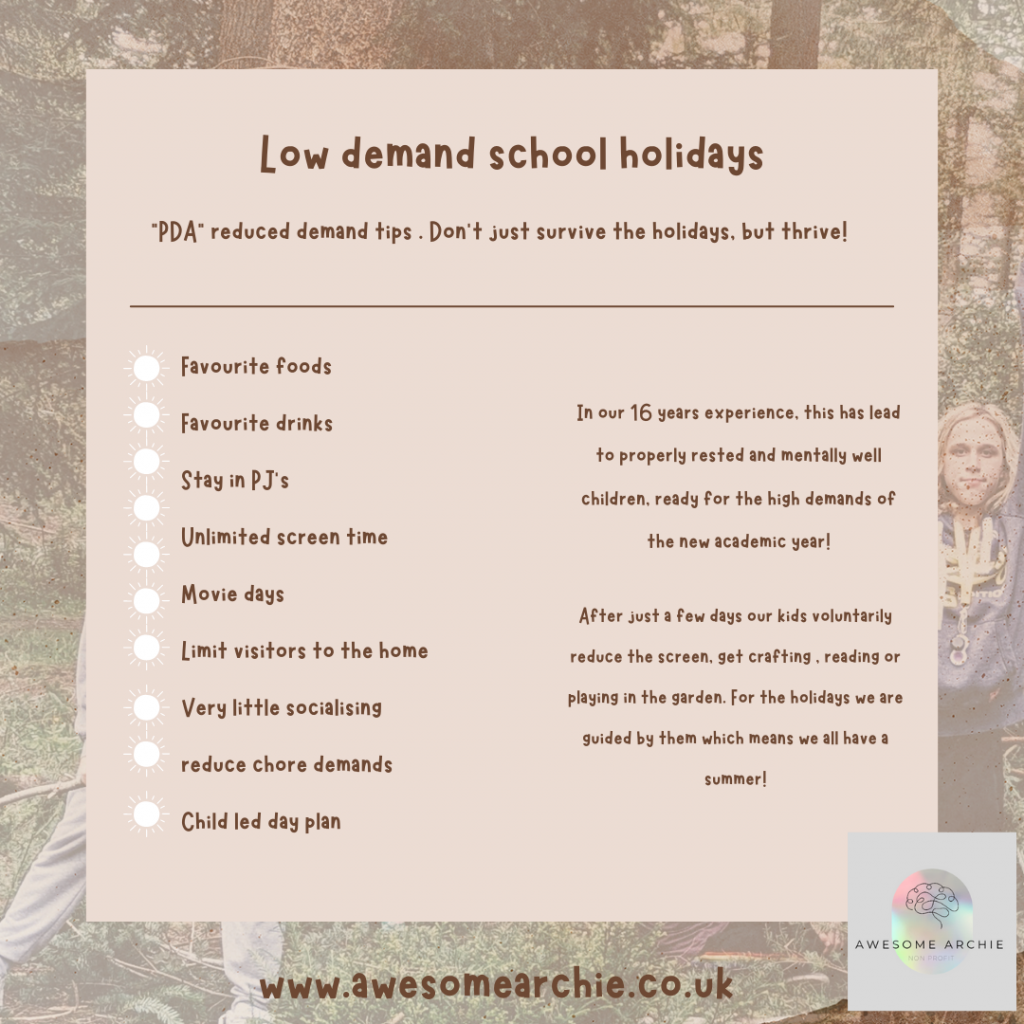Now I know that not everyone has the luxury of only working during term time, but you can still use this approach, even on your days off to make things a whole lot simpler this summer!
As a family we have had “low demand” summers for the last decade. They have truly been transformative for our neurodivergent kids, their siblings and me!
The aim of the low demand approach is to minimise a child’s anxiety and stress by reducing the demands and expectations that are placed upon them. This is simply not an option during the term time. We have to wear uniform (not Archie) get up to an alarm, go to bed at a set time etc., In our low demand summer holidays we don’t!!
This approach encourages us to think about aspects of our own parenting, such as the language that we use and the strategies we implement to reward, praise or sanction behaviour. By minimising our children’s anxiety and stress, we make a positive impact upon their overall mental health and wellbeing. When children are relaxed, feel safe, secure, and have a more equal power relationship with us as parents, they are way more receptive to learning opportunities and activities.
We know that we have a little Disney trip coming and so we reserve all the available space around that to do absolutely nothing! Low demand, low anxiety, happy kids 🙂


Over the years we have had few comments about this , particularly about the unlimited screen time thing, but hear us out…
– Online gaming (safely and closely monitored of course) is one of the only ways that many children with autism feel safe to interact in game play. The playground is noisy and confusing, board games have too many people getting over excited and none of the other options give total control. We asked our boys why they love gaming so much and this is what they said.
“I play Dummynation because it is fun. It is a bit like the old fashioned game Risk, but online. I can change history, make empires that wouldn’t normally exist and alter borders. I also complete geography quizzes on websites such as ‘Sporcle’ and ‘Jetpunk’ to help me with my geography knowledge”. Herbie.
“I like playing video games because often it helps take my mind off of the regular stresses of the day, though even when I am not stressed, I very much enjoy them. In most cases, you can do whatever you want in a game with no real life consequences. For example, my favourite game at the moment is called ‘War Thunder’ where you get to drive (and of course crash) realistic planes, boats and tanks, whereas, believe it or not, you cannot do this in real life”. Archie.
Surprisingly though, our kids wont spend all day everyday attached to a screen, in fact it feels like the less time restraint I place on it the less they want to play. They just love knowing that the option is there.
Here is a great link to the National Autistic society chatting about this further ⬇ https://www.autism.org.uk/advice-and-guidance/stories/stories-from-the-spectrum-barrington
– PJ days. This obviously doesn’t mean that we have to stay in our PJ’s… that would defeat the object! It’s merely a chance to dress as you wish, PJs, nighty, pants or a tutu for all I care 😉 Its the ability to have an option when you usually can’t!
-Cooking together. Allowing the kids to choose what they actually want to eat and giving them the option to help cook it. Who’s got time for that during term time?! We have found that our kids eat so much more when they have a freedom to choose and yes, there will be 3 different meals and a bit more washing up but it’s great… I promise.
-Saying no to visitors and limiting socialising. We will never pressure our children to fit into someone else’s schedule. It’s THEIR summer too!!!
These are just a few examples of what WE do. We share this so that if you feel like your summer holidays are just a chaotic nightmare, then you could give it a go too… you may be pleasantly surprised!

